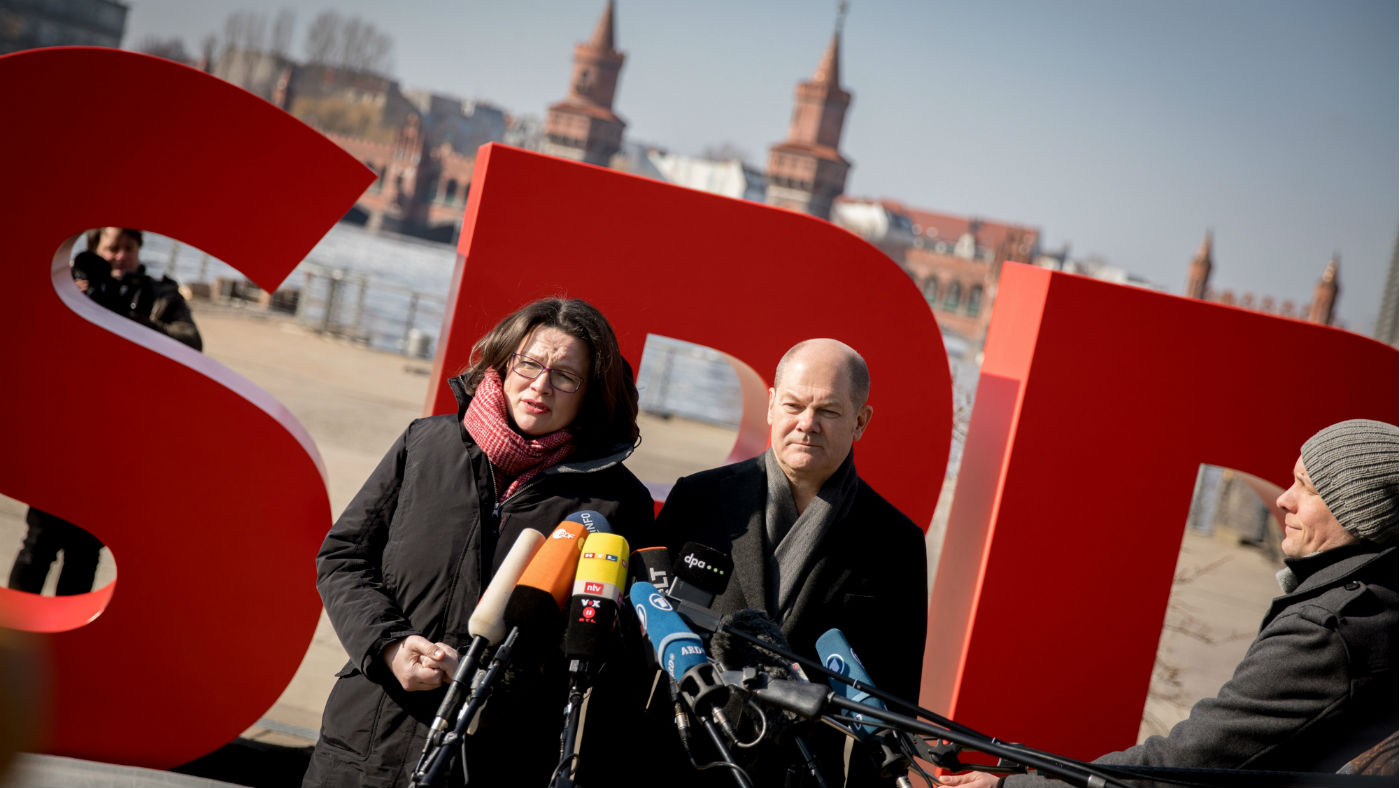Germany’s Social Democrats sign up for Merkel’s grand coalition
SPD leadership had faced stiff opposition from youth members who wanted the party to go into opposition

A free daily email with the biggest news stories of the day – and the best features from TheWeek.com
You are now subscribed
Your newsletter sign-up was successful
Members of Germany’s Social Democrats have decisively backed another grand coalition with Angela Merkel’s conservatives, ending almost six months of political uncertainty.
Social Democrat (SPD) leaders had faced stiff resistance from their radical youth wing, with many arguing the party should revive itself in opposition following last year’s disastrous election result. In the end, more than two-thirds of members voted in favour of joining another coalition with Merkel’s Christian Democratic Union (CDU).
That was “a wider margin than many had excepted”, Reuters says, meaning Merkel could be sworn in for a fourth term as early as the middle of the month, extending the coalition that has governed since 2013.
The Week
Escape your echo chamber. Get the facts behind the news, plus analysis from multiple perspectives.

Sign up for The Week's Free Newsletters
From our morning news briefing to a weekly Good News Newsletter, get the best of The Week delivered directly to your inbox.
From our morning news briefing to a weekly Good News Newsletter, get the best of The Week delivered directly to your inbox.
The agreement, under which the SPD will take control of key ministries including finance, breaks months of political deadlock in Europe’s largest economy following an inconclusive election in September.
It comes at a crucial time for the EU, with the bloc looking to Germany for leadership on security and economic issues, and French President Emmanuel Macron seeking support for EU reform plans.
At home, Merkel has to find a way of combating the rise of the far-right Alternative for Germany (AfD), which will be the largest parliamentary opposition party after securing its best-ever election result last year.
“For Europe (and Britain approaching Brexit), there will be little change” says Anne McElvoy in The Guardian. “Merkel signals emphatically in private that she sees the French president, Emmanuel Macron, as sharing her worldview, and will use her remaining time to consolidate that link.”
A free daily email with the biggest news stories of the day – and the best features from TheWeek.com
-
 The ‘ravenous’ demand for Cornish minerals
The ‘ravenous’ demand for Cornish mineralsUnder the Radar Growing need for critical minerals to power tech has intensified ‘appetite’ for lithium, which could be a ‘huge boon’ for local economy
-
 Why are election experts taking Trump’s midterm threats seriously?
Why are election experts taking Trump’s midterm threats seriously?IN THE SPOTLIGHT As the president muses about polling place deployments and a centralized electoral system aimed at one-party control, lawmakers are taking this administration at its word
-
 ‘Restaurateurs have become millionaires’
‘Restaurateurs have become millionaires’Instant Opinion Opinion, comment and editorials of the day
-
 Epstein files topple law CEO, roil UK government
Epstein files topple law CEO, roil UK governmentSpeed Read Peter Mandelson, Britain’s former ambassador to the US, is caught up in the scandal
-
 Iran and US prepare to meet after skirmishes
Iran and US prepare to meet after skirmishesSpeed Read The incident comes amid heightened tensions in the Middle East
-
 Israel retrieves final hostage’s body from Gaza
Israel retrieves final hostage’s body from GazaSpeed Read The 24-year-old police officer was killed during the initial Hamas attack
-
 China’s Xi targets top general in growing purge
China’s Xi targets top general in growing purgeSpeed Read Zhang Youxia is being investigated over ‘grave violations’ of the law
-
 Panama and Canada are negotiating over a crucial copper mine
Panama and Canada are negotiating over a crucial copper mineIn the Spotlight Panama is set to make a final decision on the mine this summer
-
 Why Greenland’s natural resources are nearly impossible to mine
Why Greenland’s natural resources are nearly impossible to mineThe Explainer The country’s natural landscape makes the task extremely difficult
-
 Iran cuts internet as protests escalate
Iran cuts internet as protests escalateSpeed Reada Government buildings across the country have been set on fire
-
 US nabs ‘shadow’ tanker claimed by Russia
US nabs ‘shadow’ tanker claimed by RussiaSpeed Read The ship was one of two vessels seized by the US military